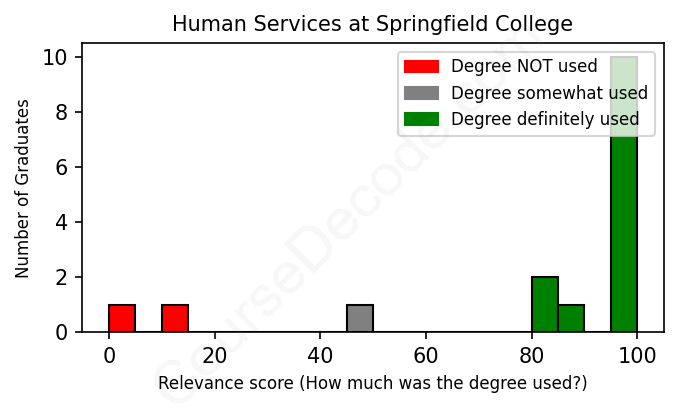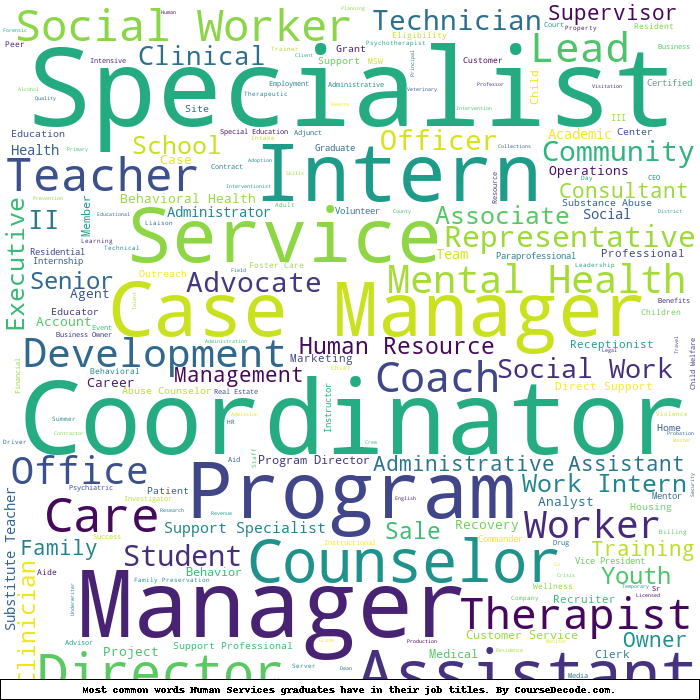
First, some facts. Of the Human Services graduates from Springfield College we've analyzed , here's how many have used (or NOT used) their degree in their career:

These are estimates based on AI analysis of 16 LinkedIn profiles (see below).
The verdict? Significantly above average. Overall, with an average relevance score of 82%, Human Services graduates from Springfield College have a much higher likelihood (+15%) of finding work in this field compared to the average graduate across all fields:
And for comparison, here's the chart for all profiles we've looked at across all degrees.
Also, after graduating, 50% of these graduates have pursued further education other than another Bachelor's degree (such as a Masters degree or other), compared to the average across all profiles of 35%. This suggests you may need more than just a Bachelors degree to be competitive as a Human Services graduate.
See the details:
|
Relevance score: 82% We think this person has gone into a career highly relevant to their degree. We think this person has gone into a career highly relevant to their degree.
DEGREE INFOGraduated in 2012 from Springfield College with a Bachelor of Applied Science (BASc) in Human Services. No other secondary education since. JOB HISTORY SINCE GRADUATIONStudent Welfare Coordinator University of Massachusetts Boston Apr 2015 - Mar 2018 Administrative Assistant  Northeastern University May 2019 - Apr 2022 Program Manager  Northeastern University Center for Inclusive Computing Apr 2022 - Present ABOUTExperienced Student Access Coordinator skilled in Case Management, benefits screening, SNAP assistance, Food Pantry operation and management, budget assistance, Microsoft Excel, , Customer Service, Microsoft Word, and Data Entry. Strong administrative professional with a Bachelor of Applied Science (BASc) focused in Human Services, General from Springfield College. |
The top 10 most common jobs done by the graduates we've analyzed (ranked most common to least) are:
Looking at the job profiles of folks who studied Human Services at Springfield College, it’s pretty clear that many of them have landed roles that are directly related to their degree. A lot of graduates have taken positions like Community Coordinator, Family Health Advocate, and Case Manager, which directly engage with people and address community needs. These roles leverage the skills learned during their education, such as advocacy, support, and program management. You can see a strong trend towards jobs in social work, education, and community outreach, indicating that many graduates are putting their knowledge to good use in fields designed to help individuals and families.
However, not every job they’ve had is tied to the core principles of Human Services. For instance, some graduates have ventured into business ownership, writing, or roles in human resources that don’t directly focus on social services. While these positions may utilize some soft skills from their degree, they lack the direct application of human services principles. Overall, though, the majority of the jobs are relevant and reflect a commitment to using their education to make a difference in their communities, highlighting a strong alignment between their studies and careers.
Here is a visual representation of the most common words in job titles for Human Services graduates (this is across all Human Services graduates we've analyzed, not just those who went to Springfield College):

Looking at the career trajectories of graduates from Springfield College with a degree in Human Services, it seems like they often start with roles that are closely tied to community involvement and support services. Many graduates take on positions such as community coordinators, social workers, or case managers right after graduation, which make sense given the focus of their studies. For instance, a lot of them get involved in advocacy work or roles that support families and children, aligning well with the Human Services field. This initial experience often sets them up for more advanced positions in the coming years.
As these graduates progress, about 5 to 10 years later, a significant number have moved up in their fields, taking on roles like program managers, clinical supervisors, or even starting their own businesses related to community services. It's clear that many have found fulfilling careers that are relevant to their degree, with some branching out into areas like education or even entrepreneurship. However, there are also examples of individuals who have strayed from traditional Human Services paths, taking on roles in sectors like real estate or education, which, while still valuable, may not directly leverage their Human Services training. Overall, it seems like the majority have maintained relevance to their degree and have built solid careers, although there are a few who have ventured into unrelated fields, too.
Honestly, getting a Bachelor’s degree in Human Services can be a bit of a mixed bag, and it’s not considered one of the hardest degrees out there, but it definitely comes with its own challenges. At Springfield College, you’ll probably find that the coursework involves a lot of practical assignments, like fieldwork and projects focused on real-life applications, which can be pretty engaging but also time-consuming. You’ll need to manage your time well and be genuinely interested in the subject matter to stay motivated. So, while it might be easier than, say, engineering or pre-med, you should still be prepared to put in some solid effort, especially if you want to get the most out of the experience!
Most commonly, in the LinkedIn profiles we've looked at, it takes people 2 years to finish a Bachelor degree in Human Services.
Looking at these Springfield College graduates, it seems like they’ve taken a pretty diverse path in the human services field, but when it comes to making good money, it's a mixed bag. Some, like the business owners and managers, likely have stronger earning potentials, especially those who own businesses like EMPRESS ME or Clean the Clutter. However, many of the other roles—like social workers, teachers, and community advocates—can be on the lower end of the salary spectrum, especially in the nonprofit sector. While some folks might be making decent livings, others might be scraping by, especially if they’re in positions that typically don’t pay all that well. So, it's safe to say that while some are probably doing well, a lot of them might be working hard for their money without the financial rewards that come with it.
Here is a visual representation of the most common words seen in the "about" section of LinkedIn profiles who have a Bachelor degree in Human Services (this is across all Human Services graduates we've analyzed, not just those who went to Springfield College). This may or may not be useful:

Here are all colleges offering a Bachelor degree in Human Services (ordered by the average relevance score of their Human Services graduates, best to worst) where we have analyzed at least 10 of their graduates:
| College | Score | Count |
|---|---|---|
 Old Dominion University Old Dominion University
|
82 | 32 |
 Springfield College Springfield College
|
82 | 16 |
 California State University, Fullerton California State University, Fullerton
|
80 | 16 |
 Western Washington University Western Washington University
|
78 | 13 |
 Columbia College Columbia College
|
77 | 13 |
 Southern New Hampshire University Southern New Hampshire University
|
60 | 11 |
 University of Phoenix University of Phoenix
|
59 | 57 |